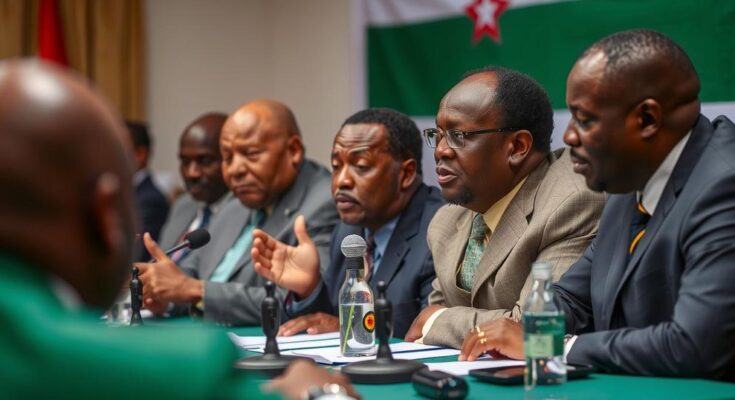President William Ruto addressed rising concerns of abductions at a funeral, assuring attendees of efforts to eliminate such practices. He emphasized the importance of rule of law and criticized social media incitements. Political tensions arose with accusations against opponents of self-abduction tactics, while leaders called for economic development and accountability within the government. Ruto highlighted his administration’s achievements and future plans for the sugar sector.
At the funeral of Moses Wetang’ula’s mother, President William Ruto addressed the alarming rise of abductions and enforced disappearances affecting critics of the government. He reassured the mourners of his commitment to ending these practices, which have led to the unfortunate recovery of bodies located in various parts of the country, such as rivers and national parks. To ensure unbiased investigations, Ruto stated that financial autonomy has been granted to the Inspector General of Police, thereby reinforcing the rule of law.
As the debate surrounding these events escalates, President Ruto warned social media users against inciting violence and criticizing his administration harshly, citing potential repercussions for Kenya’s international reputation. He urged citizens to respect the law and enhance the country’s image positively.
Tensions flared with allies of Ruto accusing political opponents of orchestrating their own abductions to tarnish the government’s image and solicit foreign aid. Cotu Secretary General Francis Atwoli and National Assembly Majority Leader Kimani Ichung’wah stated that these tactics are effectively designed to destabilize the government.
In contrast, Trans Nzoia Governor George Natembeya denounced these accusations and called for greater acceptance and effective handling of missing persons cases. He expressed frustration over the economic conditions in Western Kenya, claiming that Ruto’s affiliates have neglected development efforts in the region.
In rebuttal, Ichung’wah urged Governor Natembeya to appropriately channel his concerns regarding economic matters and dismissed his allegations regarding abductions. Prime Cabinet Secretary Musalia Mudavadi, alongside other leaders accompanying President Ruto, underscored the necessity of enforcing cybercrime regulations to curtail incitement online and reaffirmed the significance of legal adherence and accountability.
During his address, President Ruto enumerated his administration’s achievements, including decreased fertilizer costs, improved Competence-Based Curriculum policies, an increase in teacher employment, and revitalization of the sugar industry. He detailed forthcoming bonuses for sugarcane farmers and encouraged the withdrawal of pending court cases to ensure more efficient operations at Mumias Sugar Company.
The context of this article is centered around the Kenyan government’s response to troubling incidents of abductions and disappearances of individuals critical of the government. This issue has heightened concerns about security and human rights violations in Kenya and has provoked a strong political discourse among leaders. President William Ruto’s leadership is under scrutiny as he attempts to navigate the public outcry against these disappearances while maintaining his administration’s integrity and support among political allies.
In conclusion, the funeral of Moses Wetang’ula served as a platform for President William Ruto to address critical issues surrounding abductions in Kenya, advocating for the rule of law and calling for responsible social media use. The political discourse reveals a deep divide between Ruto’s administration and his opponents regarding accountability and economic concerns. Ruto’s efforts to bolster police independence and announce achievements reflect his administration’s commitment to safeguarding security and fostering developmental programs, despite opposition claims that seek to undermine his leadership.
Original Source: www.mwakilishi.com




